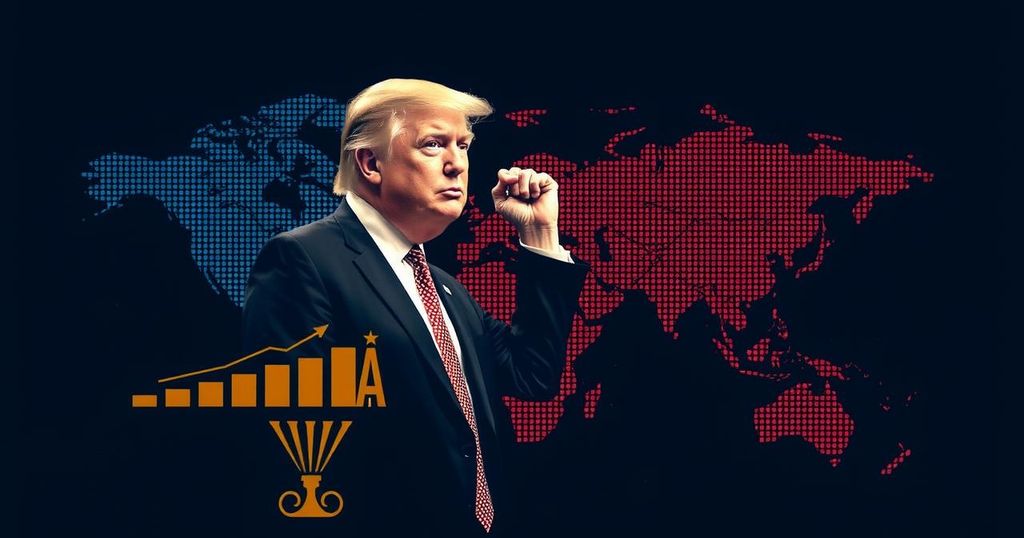Business
economics
AFRICA, ASSOCIATED PRESS, DONALD TRUMP, ECONOMY, EUROPE/ASIA, EUROPEAN, EUROPEAN UNION, GEOPOLITICS, GEORGIA, INFLATION, LONDON SCHOOL OF ECONOMICS AND POLITICAL SCIENCE, NORTH CAROLINA, SCHOOL OF ECONOMICS AND POLITICAL SCIENCE, TARIFFS, TRADE, TRUMP, WISCONSIN
Isaac Bennett
0 Comments
Uncertain Global Economic Outlook Following Trump’s Re-Election
Donald Trump’s re-election raises significant concerns for the global economy, particularly regarding proposed tariffs that could reduce global GDP growth, especially affecting emerging markets. Analysts warn of retaliatory actions from other nations and the strong possibility of economic contraction as a result of these measures, creating a precarious trade landscape for years to come.
The re-election of Donald Trump has ushered in a period of uncertainty for the global economy, triggering concerns over potential trade policies. Following the announcement of Trump as the election victor, questions arise regarding his likelihood of imposing significant tariffs, particularly on imports from China. Economists warn that such measures could dampen global GDP growth, especially affecting emerging markets that would face retaliatory actions amidst escalating trade tensions. Trump’s proposals, broadcasting a protectionist agenda, include imposing tariffs as high as 60 percent on Chinese goods, echoing practices not witnessed since the Great Depression. Such tariffs threaten to curtail consumer spending in the United States and disrupt established international trade relations. For instance, UBS estimates that these tariffs could lead to a one-percentage point decrease in global economic growth by 2026. Furthermore, economic analyses predict GDP contractions for China and the European Union due to these protective measures, with emerging economies like India, Indonesia, and Brazil also poised for modest losses. The historical context of Trump’s trade policies suggests a dramatic shift from globalization towards protectionism. His undeterred stance on tariffs, articulated numerous times during the campaign, has led to rising apprehension among analysts regarding the implications of his economic strategies. The former president’s engagement with foreign firms and threats of exorbitant tariffs signal a departure from traditional trade practices, resulting in a precarious global economic landscape. Additionally, the potential strengthening of the US dollar due to inflationary pressures from tariffs could further complicate matters for foreign economies. A stronger dollar raises the costs on imports for countries with depreciating currencies, encumbering their debt obligations tied to dollar-denominated loans. Concerns also mount regarding Trump’s attempts to influence the Federal Reserve’s independence, which could destabilize international financial markets if trust in US fiscal management erodes. As such, the repercussions of Trump’s re-election are likely to extend far beyond the United States, affecting numerous global economies and instigating a re-evaluation of international trade dynamics. The financial landscape waits with bated breath as the world watches how these policies will unfold.
The article discusses the potential global economic repercussions of Donald Trump’s re-election as President of the United States. It focuses on the anticipated trade policies, particularly regarding tariffs on imports from countries such as China, which observers believe could significantly hinder economic growth worldwide. With a growing trend towards protectionism, this shift is understood to complicate the longstanding global trade framework that has characterized recent decades. Analysts provide insights based on quantitative estimates regarding the effects on various economies, highlighting the potential strain on emerging markets amidst evolving US trade strategies.
In conclusion, Donald Trump’s re-election poses substantial risks to the global economy through potential increases in tariffs, placing emerging markets under strain. With predictions of reduced GDP growth across multiple nations, the ramifications of his protectionist policies could reverberate worldwide, leading to greater economic uncertainty. As Trump navigates his second term, the commitment to such policies may redefine international trade relations and financial stability.
Original Source: www.aljazeera.com




Post Comment